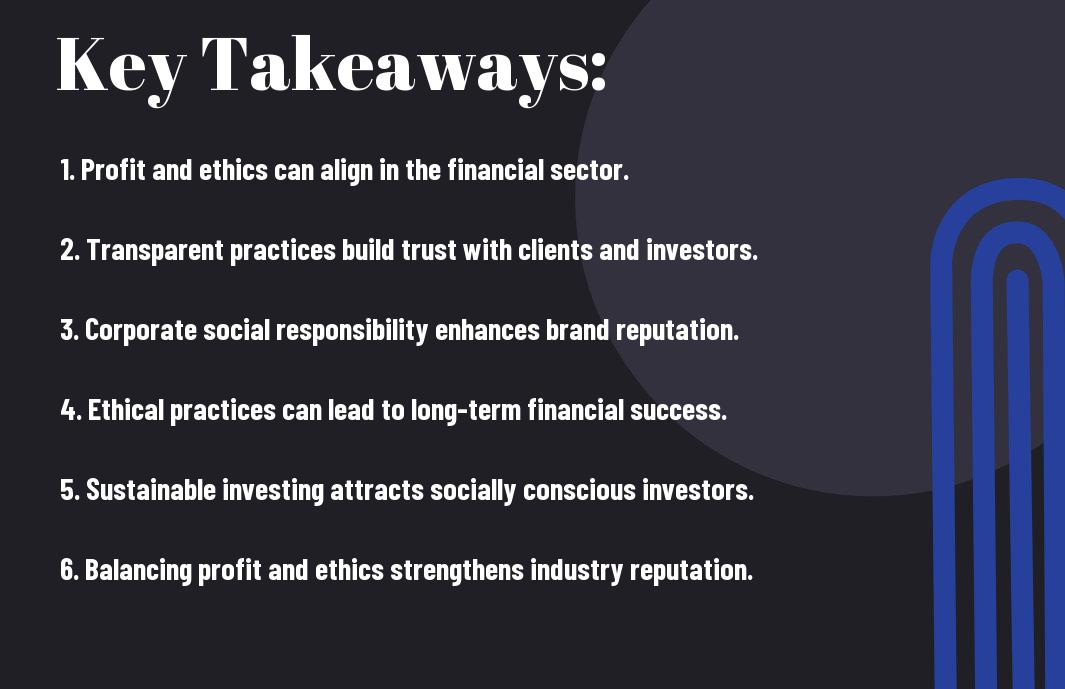Just like any other sector, the financial industry faces the challenge of balancing profit with ethics. You may wonder if it’s possible for companies to be both profitable and socially responsible. In this post, we will explore the complex relationship between profit and ethics in finance. You’ll discover how ethical practices can actually contribute to long-term success, and why they are important for you as a consumer and investor. Let’s dive in to understand this vital topic better.
Key Takeaways:
- Ethics play a key role in building trust with clients, which can lead to long-term profitability in the financial industry.
- Companies that prioritize ethical practices can differentiate themselves from competitors, attracting more customers and investors.
- Balancing profit and ethics involves creating transparent policies and ensuring compliance with regulations, which ultimately supports sustainable growth.


Understanding Profit in the Financial Industry
To navigate the financial world, it’s necessary to grasp the concept of profit. Profit is the money a company makes after subtracting its expenses. In the financial industry, this includes income from loans, investments, and fees. Profit represents the success of a financial institution and is vital for its growth and stability. You will find that understanding profit helps you see how financial institutions operate and make decisions.
Definition of Profit
By definition, profit is the financial gain that remains after deducting all operating costs, taxes, and expenses. It is often expressed as a percentage of revenue, giving you a clear view of how well a company is performing. In the financial sector, profit can come from various sources, including interest from loans, trading activities, and investment portfolios. Understanding this definition is key for anyone looking to engage with the financial industry.
Importance of Profit for Financial Institutions
Above all, profit is vital for financial institutions as it ensures their survival and growth. Profit allows banks and investment firms to pay employees, invest in new technologies, and expand services. Moreover, profit serves as a buffer against losses during tough economic times, enabling institutions to weather financial storms. Your understanding of these points can help you assess a financial institution’s reliability and overall health.
Profit plays an important role in attracting investors to financial institutions. A company that consistently generates profit is more likely to attract funding, which can further enhance its services and offerings. Additionally, profit enables institutions to refund deposits to customers, ensuring trust and stability. When evaluating financial institutions, you should look at their profit trends to gauge their potential for growth and security in the competitive marketplace.
The Role of Ethics in Finance
Some people believe that ethics and profit can’t go hand in hand in finance. However, this view may be shortsighted. Ethical practices in finance can lead to long-term success and sustainability. You can find more on this idea in the article How Ethical Business Tactics Can Improve Profitability. When you prioritize ethics, you not only improve your reputation but also build trust with your clients and stakeholders.
What are Ethics?
After defining ethics, you realize it means following moral principles in your actions. In finance, it involves being fair, transparent, and responsible. You should consider how your choices affect others. Ethics guide you in deciding what is right and wrong, especially in complex situations.
Ethical Considerations in Financial Practices
Considerations regarding ethics in finance often include honesty, accountability, and fairness. You must evaluate how your decisions impact clients and the market. For example, misleading information or hidden fees can harm your reputation and lead to distrust.
In fact, ethical considerations are vital in building strong relationships in finance. You should always strive to provide clear information and be honest about risks and rewards. Practicing transparency not only strengthens your credibility but also enhances overall industry standards. When you focus on ethical behavior, everyone wins—your clients, your company, and the entire financial ecosystem.
The Conflict Between Profit and Ethics
All financial firms face a constant struggle between making money and following ethical standards. In pursuit of higher profits, companies may cut corners or engage in practices that are not in the best interest of their clients. This conflict can lead to a significant trust gap between consumers and financial institutions. You might wonder if it’s possible for profit and ethics to exist side by side, and understanding this conflict is crucial for making informed decisions in the financial industry.
Case Studies of Ethical Failures
Before diving deeper, let’s examine some well-known ethical failures in the financial industry:
- Enron (2001): Manipulated financial statements, leading to a loss of $74 billion for shareholders.
- Lehman Brothers (2008): Used deceptive accounting to hide $50 billion in debt, resulting in bankruptcy and a global financial crisis.
- Wells Fargo (2016): Created 3.5 million fake accounts, leading to fines over $185 million and severe reputational damage.
- Volkswagen (2015): Cheated on emissions tests affecting 11 million vehicles, costing the company billions and damaging consumer trust.
The Impact on Stakeholders
Any action taken by financial companies can impact various stakeholders, including customers, employees, and investors. When ethics are compromised for profit, consumers often face losses and reduced trust. Employees might feel demoralized, leading to lower productivity and higher turnover. Investors, on the other hand, can experience significant financial loss if a company faces legal issues or reputational damage due to unethical practices. Overall, the conflict between profit and ethics not only affects the company but also has far-reaching consequences on all stakeholders involved.
Conflict arises when the focus is solely on short-term gains. Pursuing profit without ethics can lead to the downfall of even the mightiest firms. It’s vital for you to consider both aspects when engaging with financial institutions. Ethical practices not only build trust but also ensure long-term success and stability in the financial industry.

Finding Common Ground
Despite the traditional view that profit and ethics cannot coexist, there is a growing trend toward finding common ground in the financial industry. Companies are increasingly realizing that ethical practices can lead to sustainable profits. By aligning values with customer expectations, businesses can gain not only trust but also market share. This shift encourages a balance between making money and doing what is right, benefiting both shareholders and society.
Ethical Financing Practices
Above all, ethical financing practices are gaining traction. Many financial institutions are now prioritizing transparency and fairness. This means offering loans with reasonable interest rates and clear terms. You might be surprised to learn that customers prefer companies that act ethically, which, in turn, can enhance your reputation and attract more clients.
Profitability through Ethical Solutions
Along with ethical financing, profitability can also be achieved through innovative ethical solutions. This means creating products that not only meet market demands but also consider social responsibility. Many companies report improved customer loyalty when they focus on ethical practices, proving that you don’t have to sacrifice profit to do good.
Even more encouraging is the fact that ethical solutions can lead to long-term profitability. Research shows that businesses embracing sustainable practices often see a boost in customer engagement. For instance, companies that promote green investments or socially responsible funds attract a younger audience keen on making an impact. By aligning your financial strategies with ethical practices, you can create a competitive advantage that benefits everyone involved.
Regulatory Framework and Oversight
Not all financial industries operate without oversight. Regulations play a significant role in ensuring that companies act ethically while pursuing profit. These rules are designed to protect customers, investors, and the general economy. With proper oversight, you can see a clearer path where profit can align with ethical practices. This balance creates a healthier financial environment for everyone involved.
Role of Regulation in Ethical Finance
Behind every ethical finance practice lies a robust regulatory framework. Regulations help to promote transparency and accountability in financial activities. This means you can trust that companies are following rules meant to protect you and your interests. Without these guidelines, unethical behavior could easily go unchecked, leading to widespread harm.
Key Regulations Impacting Profit and Ethics
Along with establishing trust, several key regulations shape how profit and ethics function together in finance. These include the Dodd-Frank Act, which was implemented to prevent financial crises, and the European Union’s MiFID II, aimed at increasing transparency in trading. These regulations encourage firms to prioritize ethical practices alongside profit-making efforts.
This framework not only regulates financial transactions but also fosters a culture of ethical behavior within firms. For instance, the Dodd-Frank Act enforces stricter rules on risky financial products while promoting responsible lending. Similarly, MiFID II requires firms to disclose fees and commissions clearly to you. Knowing these regulations helps you identify ethical companies that prioritize your best interests alongside their own profit goals.

Future Trends in the Financial Industry
For the financial industry, the future holds exciting changes. More businesses are beginning to understand the balance between profit and ethics. This shift can create new opportunities for firms that embrace integrity. As you move forward in this industry, staying informed about these trends will help you adapt and thrive.
Growing Importance of Corporate Social Responsibility
Between increasing consumer awareness and global challenges, corporate social responsibility (CSR) has become vital. You may notice that more companies focus on ethical practices and sustainability. Customers often prefer brands that show they care about social and environmental issues. Thus, CSR can lead to improved brand loyalty and stronger financial performance.
Innovations Promoting Ethical Profitability
Responsibility is becoming a key driver of innovation in the financial industry. Companies are adopting new technologies to promote ethical practices. For instance, blockchain offers transparency, helping you verify transactions and reduce fraud. Moreover, financial firms are creating investment funds focused on socially responsible companies. By investing in such options, you can align your financial goals with ethical values.
Industry leaders are actively exploring different ways to integrate ethics into daily operations. From online platforms that support sustainable investing to apps that encourage ethical spending, the landscape is changing fast. You have the chance to participate in this transformation and support initiatives that enhance both profits and social good. Keep an eye on these innovations as they reshape the future of finance.
Final Words
Ultimately, you can see that profit and ethics can coexist in the financial industry. By prioritizing integrity and responsibility, you can build long-term success and trust with clients. Making ethical choices may require sacrifices in the short term, but they often lead to a stronger reputation and sustainable growth. So, as you navigate this complex field, aim for balance between making a profit and upholding ethical standards. This approach not only benefits your career but also contributes positively to the industry as a whole.
FAQ on “Can Profit and Ethics Coexist in the Financial Industry?”
Q: What does it mean for profit and ethics to coexist in the financial industry?
A: Coexisting profit and ethics means that financial companies can make money while also acting fairly and responsibly. This involves treating customers with respect, being transparent about fees, and avoiding deceptive practices. It shows that businesses can be successful without compromising their values.
Q: How can financial companies ensure they are acting ethically?
A: Financial companies can ensure they are acting ethically by implementing clear guidelines and codes of conduct. They should focus on transparency, provide accurate information, and listen to customer feedback. Training employees on ethical standards and regularly reviewing practices also helps maintain high ethical standards.
Q: Are there examples of financial companies that prioritize ethics over profit?
A: Yes, several financial firms make ethics a priority. For instance, some community banks focus on helping local businesses rather than just maximizing profits. Additionally, socially responsible investment funds choose companies based on ethical criteria, showing that profit can be aligned with positive social impact.
Q: What challenges do financial companies face when trying to balance profit with ethics?
A: One major challenge is the pressure to meet profit targets. Some companies may feel tempted to take shortcuts or engage in misleading practices to boost profits quickly. Furthermore, there is often a fear that ethical behavior might drive away customers looking for lower costs, making it hard to maintain both ethics and profitability.
Q: How can consumers encourage ethical behavior in the financial industry?
A: Consumers can encourage ethical behavior by choosing to work with companies that share their values. They can research financial institutions, ask questions about their practices, and demand transparency. Providing feedback and holding companies accountable can also push the industry towards more ethical standards.
Conclusion
Conclusively, profit and ethics can coexist in the financial industry, and it is vital for companies to find a balance. By prioritizing ethical practices, financial firms not only build trust but also foster long-term success. As consumers, our choices influence the industry. Let’s support companies that uphold strong ethical standards while also striving for profitability.




